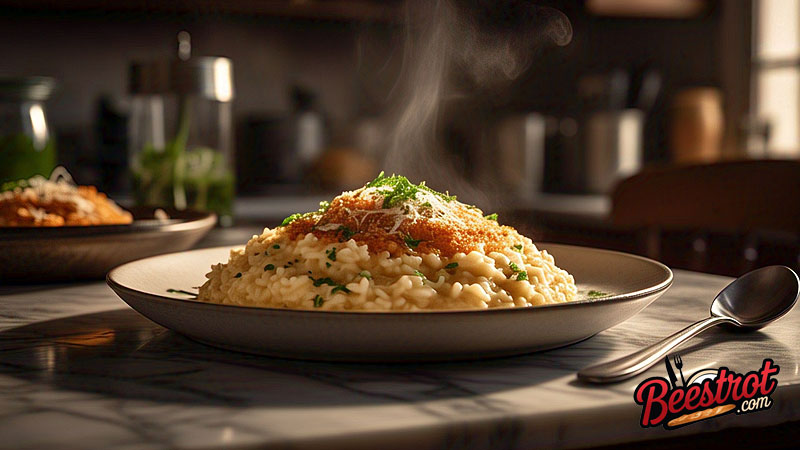Risotto Alla Milanese

Click here to learn about our image policy and how to submit your own!
Risotto alla Milanese traces back to 16th century Milan, where it was traditionally served alongside ossobuco. This luxurious northern Italian dish gets its distinctive golden hue and aromatic quality from precious saffron threads, originally added to give the impression of expensive gold leaf. The slow-cooking process creates a creamy consistency while maintaining each grain's integrity, exemplifying the patient, attentive nature of classic Italian cuisine.
Time & Quantities
Method & Ingredients
Required Equipment: Medium heavy-bottomed pot or Dutch oven, ladle, wooden spoon, small bowl, saucepan
Cooking Method: Not specified
Ingredients
- 1.5 cups Arborio or Carnaroli rice
- 5 cups chicken or vegetable broth
- 1 small onion
- 2 tbsp butter
- 2 tbsp olive oil
- 1/2 cup dry white wine
- 1/4 tsp saffron threads
- 1/2 cup Parmigiano-Reggiano cheese
- 2 tbsp bone marrow
- salt
- white pepper
Instructions
- In a small bowl, crumble saffron threads and add 2 tablespoons of warm broth. Let steep for 10 minutes to release color and flavor.
- In a saucepan, bring remaining broth to a simmer, then reduce heat to low to keep warm.
- Heat olive oil and 1 tablespoon butter in a heavy-bottomed pot over medium heat. Add onion and cook until translucent, about 4-5 minutes.
- Add rice and stir for 2-3 minutes until grains are well-coated and slightly translucent at the edges. This is called 'toasting' the rice - it's your foundation for perfect risotto!
- Pour in white wine and stir constantly until completely absorbed.
- Add a ladle of warm broth to the rice, stirring gently until liquid is absorbed.
- Continue adding broth one ladle at a time, stirring frequently and waiting until each addition is absorbed before adding the next. This is your meditation time - embrace it!
- After about 15 minutes, add the saffron-infused broth and stir to distribute the golden color evenly.
- Continue adding broth and stirring until rice is al dente - tender but with a slight resistance at the center, about 18-20 minutes total cooking time.
- Remove from heat and vigorously stir in remaining tablespoon of butter, Parmigiano-Reggiano, and optional bone marrow. This final stirring is called 'mantecatura' and creates the signature creaminess.
- Season with salt and white pepper to taste.
- Let rest for 2 minutes, then serve immediately on warmed plates.
Storage & Make-Ahead
Storage Advice: Best served immediately. Leftovers can be refrigerated for up to 2 days and reheated with a splash of broth but the texture will not be as creamy as freshly made.
Make-Ahead & Freezing Tips: Not ideal for making ahead or freezing as the texture significantly deteriorates.
Nutritional & Dietary Information
Nutritional Information:
- Calories: 420
- Protein: 12g
- Fat: 18g (Saturated: 8g)
- Carbohydrates: 48g (Fiber: 2g, Sugar: 2g)
- Vitamin A: 8% DV
- Vitamin C: 2% DV
- Calcium: 15% DV
- Iron: 10% DV
Allergen Information: Contains dairy (butter, cheese)
Dietary Information: Contains dairy; not suitable for vegans or those with dairy allergies. Can be made vegetarian by using vegetable broth and omitting bone marrow.
Serving & Variations
Serving Suggestions: Serve in shallow bowls, garnished with additional Parmigiano-Reggiano and a light grating of lemon zest if desired. Traditionally paired with ossobuco (braised veal shanks) for a complete Milanese meal.
Wine or Drink Pairing: A crisp, dry white wine from northern Italy like Soave or Pinot Bianco complements the rich, creamy texture. For special occasions, pair with Franciacorta, Italy's premium sparkling wine from Lombardy.
Possible Recipe Variations: Risotto ai Funghi: Add sautéed wild mushrooms and omit saffron. Seafood Risotto: Replace saffron with seafood and finish with herbs. Spring Risotto: Add fresh peas, asparagus tips, and lemon zest.
Additional Notes: The key to perfect risotto is patience - add liquid gradually and stir frequently but gently to release the rice's natural starch without breaking the grains.






Made it yesterday. Added lemon zest which brightened it up nicely.
Ce risotto me rappelle mon voyage à Milan l’année dernière! Est-ce que le safran est vraiment nécessaire? Je le trouve assez cher ici en France.
C’est vrai, le safran n’est pas donné partout dans le monde. Vous pouvez le remplacer par du turmeric (curcuma) et paprika, voilà! 😉